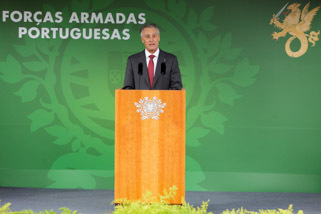
My first words are to congratulate President Peña Nieto for the excellent organisation of this XXIV Ibero-American Summit. I would also like to extend my thanks to your authorities who have so kindly welcomed us.
This year, I say it with particular emotion that I feel very pleased to be among you. Symbolically closing in Veracruz, Mexico, the cycle of participation in the Ibero-American Community opened in 1991 and that I attended, which was the founding moment of the Ibero-American project.
As in 1991, I still firmly believe in the spirit of Guadalajara and in the pillars used as the foundation of our Community, which defends democratic values and promotes the well-being as well as the economic and social development of our populations.
Ladies and Gentlemen,
Today, we are living in difficult times of uncertainty and change compelling States to implement innovative development policies, specifically aimed at business promotion and job creation: I greet Mexico for selecting the theme of this Ibero-American Summit: Education, Innovation and Culture in Ibero-America. Allow me to share some reflections on this theme.
In the next decades, the so-called “knowledge economy” characterised by the central role of innovation in the supply of goods and services, management model and labour organisation will dominate the Ibero-American space.
In the global world we live in, it is education which equips the citizens with the skills and competences which stimulate productivity and the innovation capacity enabling to assert themselves in a highly competitive context.
Therefore education has a decisive impact on economic progress, and at the same it takes on the crucial role in fighting poverty, social inequalities and in promoting social cohesion.
The universities play a vital role, not only in the traditional education and research sphere but also in the interaction with other centres of knowledge production and in the transfer of know how to companies and to society as a whole.
The innovation process will necessarily incorporate in the next decades to come, the strategic vision of any company.
Innovation will, indeed, become its main competitive tool.
Therefore, the educational system, including lifelong learning, has to be capable of equipping our citizens with the necessary competences to address the new challenges of the labour market, and to instill in young people, a culture of ambition, of risk exposure and entrepreneurship.
Placing knowledge and innovation at the top of individual and collective priorities is an ambition which requires convergence of efforts. It has to involve schools, companies, universities, public powers and society in general.
I strongly believe that the future of any nation is based on education and knowledge. And this is widely acknowledged at European level and as suggested by the theme of the 25th Ibero-American Summit, which should also constitute one of the main lines of the Ibero-American process.
As for this chapter, I am convinced of how important it is to consolidate the Ibero-American Space of Knowledge, of Culture and Social Cohesion and to foster an “Alliance for Academic Mobility” by promoting the mobility of students, teachers and researchers. In this context, mutual qualification recognition and academic degrees are particularly important.
The same can be said regarding policies, inside the Ibero-American space which encourage internships as well as manager and employee training in companies.
Portugal has been strongly investing in the qualification of its human resources. A lot of investment has been made over the decades, including pre-school education as well as increasing compulsory education until 12 years of school, in addition to the active policies to combat early school leaving and school failure.
In the last 20 years the number of graduates has quintupled and more recently the country has registered one of the highest percentage growth rate at European level of young PHD holders.
It is through know how and knowledge as well as recognising merit and talent that we combat the tendency to perpetuate inequalities founded on our social origins.
We also need to bear in mind that progress and the dissemination of technology require a scientific capability which can only be achieved by integrating networks of international cooperation.
For example, in the field of nanotechnology, Portugal and Spain have developed a bilateral cooperation network and the result was a prestigious joint research centre, operated by both countries, the International Iberian Nanotechnology Laboratory established a decade ago.
Ladies and Gentlemen,
It is essential for innovation, together with education, to become an instrument reducing social asymetries. I believe that from linking education, research and innovation, new driving forces of economic growth can emerge promoting the creation of wealth at the same time as promoting social inclusion and environmental sustainability.
This is the challenge of the future, challenge which has already started and which urges us to act according to the agenda for the 21st century conferences proposed by the Ibero-American Summit and which is reflected in the declaration of Vera Cruz.
Thank you, Everyone.
© 2006-2016 Presidency of the Portuguese Republic
You have gained access to the records of the Official Site of the Presidency of the Republic from 9 March 2006 to 9 March 2016.
The contents available here were entered in the site during the 10 year period covering the two mandates of President of the Republic Aníbal Cavaco Silva.